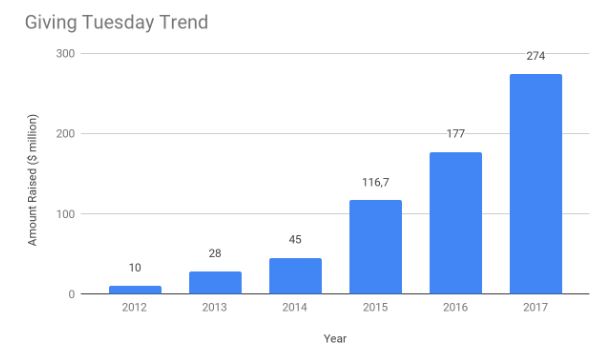Born in 2012 by the will of 92nd Street Y and the United Nations Foundation, #GivingTuesday is a movement that gave life to what can be considered as the global day of giving. It is celebrated on the first Tuesday after the American Thanksgiving Day and immediately after 2 other commercial events, that were born as a result of that day: Black Friday and Cyber Monday.
In 2014, 2 years after its launch, $45 million were collected in 24 hours; that number more than doubled in 2015 ($116 million) and reached $274 million in 2017. The trend thus is about 50% growth per year!

source: Wikipedia
Most of these donations are processed online and this, in addition with the development of further emerging payment technologies, have led the World Wide Web to become a point of reference for this movement.
Access to online donations has been simplified first by PayPal and then by web giants such as Facebook, which since 2017 allows individuals to open birthday fundraisings, share them with friends and support their favorite non-profits.
But how will online donations evolve over the years and which role can cryptocurrencies play during the Giving Tuesday?
If in 2018 we talk about online transactions it’s impossible to not mention cryptocurrencies. Despite the ups and downs, that characterize this ecosystem, the sector has never stopped growing. After the January peak, now there are about 250 thousand transactions per day on the Bitcoin network1 and 500 thousand on Ethereum2, while Lightning Network3 reached 11 thousand open channels.
Even if there are still some difficulties, cryptocurrencies are nowadays commonly considered as an online payment method.
Two trends are emerging:
- early adopters, that decide to donate part of their funds to non-profit organizations
- small donors who appreciate the opportunity to donate using cryptocurrency.
In the first category the most known example is Pineapple Fund, an anonymous individual who announced to donate 5104 bitcoins during the last Christmas, $84 million at that time. If capitalization of cryptocurrencies will grow exponentially again, other people will have to handle an unimaginable amount of money and will evaluate to act as Pineapple.
Nonprofits must therefore be ready to receive these capitals and facilitate the donation process, as often these donors prefer to remain anonymous.
In the second case, the work that should be done by the NGO is different. By launching initiatives on social networks and collaborating with other crypto platforms, it is possible to bring bitcoiners and altcoiners closer to the charity world, encouraging them to donate during holidays and special occasions.
Giving Tuesday is part of the latter case. During those 24 hours many charitable initiatives related to online donations are promoted but at the moment there are fews linked with cryptocurrencies. As highlighted by Crypto Giving Tuesday, there are about forty NGOs that accept cryptos (mainly Bitcoin) and among these there are some famous names such as UNICEF, Save The Children, Direct Relief, Wikimedia or GiveDirectly, but crypto promotion is not boosted.
Crypto owner are more and more, but often they are not aware of which NGOs accept Bitcoin. This happens because nonprofits don’t highlight this opportunity, maybe worried by the vacillating legitimacy of cryptos in the mass media.
The wave of innovation does not stop due to public judgments and nonprofits should exploit these new tools in order to expand their fundraisings.
According to the Global NGO “Technology Report”4, Bitcoin today is accepted only by 1% of the nonprofits: we can therefore expect that for this Giving Tuesday cryptocurrencies will represent few percentage points of the total collected amount. If on that day cryptos will reach a volume close to $300 thousand (0.1% of the 2017 volume), it can already be considered a very positive result.
We are still far from mass use in this sector: we need a greater contribution from the community, in order to bring nonprofits closer to cryptocurrencies, and on the other hand the influence of institutional bodies will continue to be decisive for the global spread of cryptos.
Happy Giving Tuesday!
1 Source: Blockchain.info
2 Source: EtherScan.io
3 Source: https://1ml.com/statistics
4 http://techreport.ngo/wp-content/uploads/2018-Tech-Report-English.pdf
